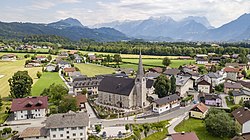
Salzburg is an Austrian federal state. In German it is called a Bundesland, a German-to-English dictionary translates that to federal state and the European Commission calls it a province. In German, its official name is Land Salzburg, to distinguish it from its eponymous capital Salzburg. For centuries, it was an independent Prince-Bishopric of the Holy Roman Empire. It borders Germany and Italy.

The market town of Bad Fischau-Brunn is an Austrian municipality in the district of Wiener Neustadt-Land in Lower Austria. It is situated some 50 km south of Vienna at the edge of Viennese Basin.

Hallein is a historic town in the Austrian state of Salzburg. It is the capital of Hallein district.
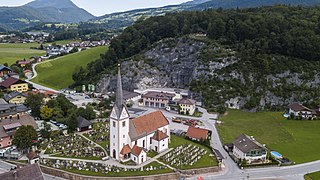
Adnet is a town in the district of Hallein, in the Austrian state of Salzburg. It is famous for its marble and there is a marble museum in the middle of the town.

Annaberg-Lungötz is a municipality in the district of Hallein, in the Austrian state of Salzburg.

Bad Mitterndorf is a town in Salzkammergut in the Austrian state of Styria.

Saalfelden am Steinernen Meer is a town in the district of Zell am See in the Austrian state of Salzburg. With approximately 16,000 inhabitants, Saalfelden is the district's largest town and the third of the federal state after Salzburg and Hallein.

Anif is a municipality of Salzburg-Umgebung District in the Austrian state of Salzburg.

Bad Bleiberg is a market town in the district of Villach-Land, in Carinthia, Austria. Originally a mining area, especially for lead, Bad Bleiberg today due to its hot springs is a spa town.
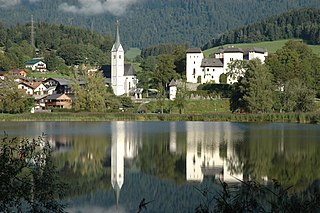
Goldegg, also called Goldegg im Pongau, is a municipality in St. Johann im Pongau District, in the state of Salzburg in Austria.

Abtenau is a market town in the Hallein District of Salzburg in Austria. The municipality is located in Lammertal, Tennengau, about 45 kilometres (28 mi) south of Salzburg and encompasses the entire middle valley of the Lammer.
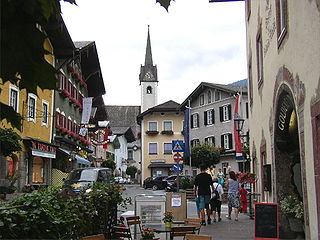
Golling an der Salzach is a market town in the Hallein district of Salzburg, Austria.
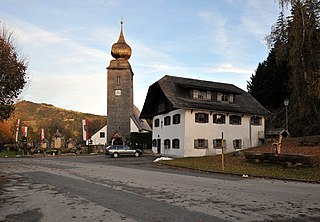
Krispl is a municipality in the Hallein district in the Austrian state of Salzburg.

Kuchl is a market town in the Hallein district of Salzburg, Austria.
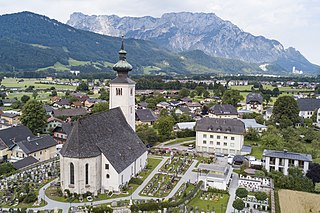
Oberalm is a market town in the Hallein district in the Austrian state of Salzburg. It is the burial town of volksmusik singer Karl Moik, the longtime presenter of ORF Musikantenstadl.

Puch bei Hallein is a municipality in the Hallein District (Tennengau) of the Austrian state of Salzburg.

Rußbach am Paß Gschütt is a municipality in the Hallein district in the Austrian state of Salzburg.

St. Koloman is a municipality in the Hallein district in the Austrian state of Salzburg.

Scheffau am Tennengebirge is a municipality in the Hallein district of Salzburg, Austria.

St. Veit im Pongau is a market town in the St. Johann im Pongau district in the Austrian state of Salzburg. St. Veit is the first healthy climate spa town in Salzburg. Submontane to the "Hochglocker" there is the 1912 founded sanatorium. Author Thomas Bernhard was treated in there and he also wrote a book about his residence at the clinic.
